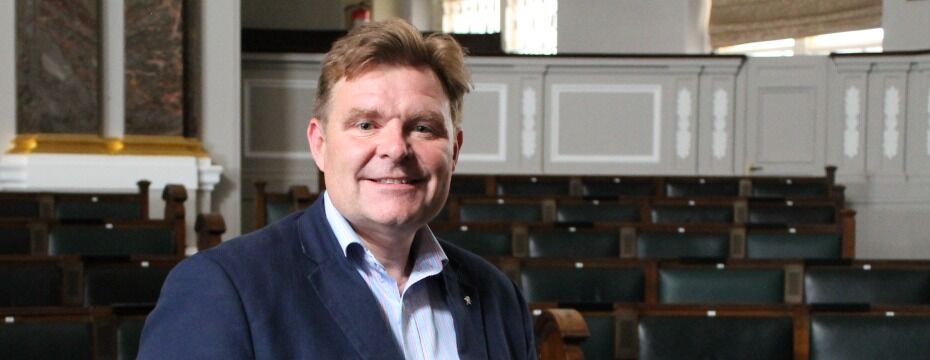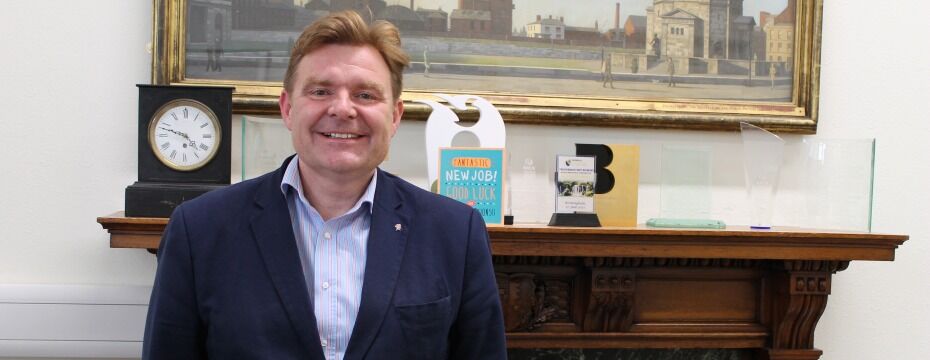University News Last updated 11 July 2023

Councillor John Cotton became the leader of Birmingham City Council, the biggest council in Europe, earlier this year after somewhat of a radical intervention by the Labour Party.
A lifelong Labour activist, John arrived at BCU back in 1992 to study for a BA in Government after spending his teenage years seeing those around him impacted by the Community Charge, commonly known as the poll tax, a system of taxation introduced in 1990.
But how did a graduate, who grew up just down the road from BCU’s City North campus in Perry Barr where he studied, become the leader of our city’s council? Alumni Communications Officer, Bethan Challoner, went along to meet John and find out all about his life and career so far.
Sitting at a table in his office in the historic Council House in Victoria Square, John shows me the artwork adorning his walls, all, of course, painting and illustrations of our city.
John has seen first-hand how much Birmingham has changed over the years. He’s local, growing up and studying in Perry Barr, and now a Councillor for Glebe Farm and Tile Cross, as well as being the Leader too. He studied at BCU in the early 90s, a time of great change for both the city, and the Labour Party.
He said: “It was great to be a student back then. There were fantastic things like Snobs and Mr Egg! I also didn't have to travel too far to university, because I was born and brought up in Perry Barr. I grew up just a couple of miles up the road, and ended up studying there.
“I was the first person in my family to go to university. I actually got a maintenance grant, from the very local authority that I now lead, which enabled me to go to university in the first place. If I hadn’t had a maintenance grant, I don't think I'd have been able to go at all.
“Birmingham was already changing at that point. The city I grew up in during the 80s was very much dominated by concrete. But that was starting to change. We'd already seen the ICC and the NIA pop up in the city centre, and the city's economy was changing as well. We were transitioning from a city known for its motor industry to the more diverse economy that we've got today. But unemployment was bad, and there were many social divisions separating the city too.
“In recent years, it has been incredible to be in Birmingham. The Commonwealth Games put us on the global stage. I just had a huge sense of local boy pride, with the opening and closing ceremonies taking place in the area where I grew up. Events happening where I rode my bike as a kid. People are seeing what a great place this is, and they want to come here. It is now our opportunity to build on that.”
John’s journey into politics wasn’t straightforward though, but he found his political voice whilst studying at BCU.
He said: “I grew up in a family that wasn't party political, but aware of what was happening around us. As I got older, I grew angry about issues that I was seeing in society and across the city. The poll tax was a really iniquitous thing that just clobbered people that I knew, including members of my own family. It was around that that I’d just started my O-Levels. I managed to just scrape enough GCSES to get into Sixth Form. I wasn't a particularly switched-on student, but I ended up picking Politics as one of my O-Levels, which felt random at the time, but it was clearly being fuelled by what was going on around me. It then led to me choosing Government at BCU.
“When I was a university student, you'd be unsurprised to discover that I was in the Labour Club. So, my interests would be similar to what they are now. I was quite active in the Labour Club and was very much involved in anti-racism campaigning and LGBTQ+ rights, which were two of the other things that got me politically active, after seeing the appalling ways that my black and Asian friends were being treated, and the sense of injustice that my LGBTQ+ friends had to face too.”
After graduating in 1995, it wasn’t long until John was finding his way into local politics, but it didn’t come without its challenges.
He said: “One of the first jobs I had after university was being a Volunteer at the Citizens Advice Bureau. Seeing the challenges that people were facing in the mid-90s due to changes happening in the welfare system was powerful. There were so many people at various stages of crisis that I was having to help. But at the same time, I was also having to sign on every two weeks too, as I couldn’t find a paid role, so I was having to face the same issues as them.
“I managed to get a job selling advertising over the phone, which I think was the most soul-destroying five months of my life. I then ended up working for what was then NatWest Mortgage Services. During my time there, I made friends and we all discovered that we we're Labour Party members. This was in the run up to the 97-election, so it was an exciting time for Labour.
“They encouraged me to get more involved with the Labour Party, and I was fortunate to join a branch in Perry Barr that was really active. I got involved in local campaigning, and eventually ended up getting selected as a Councillor for Oscott in 1999, which was a ward in the north of the city which incidentally covered the area where I went to school. I was 25, and the irony was that the Conservative candidate in the election who I was up against, was the Chair of Governors at Great Barr School when I was there. I even remember when she came in to talk to my class in my final year of school about what it’s like to be a Councillor. Less than nine years later, I was selected in what had been her seat.
“I was still working for NatWest when I first got elected to the Council, but not long after, I started working for Gisela Stuart, who was then the MP for Edgbaston. I worked as Gisela’s Press and Communications Officer for almost 10 years.
“I lost my seat in Oscott in 2008, which was a bad year for Labour. But two years later, I became a Councillor for Shard End and I’ve been based in that end of the city ever since. Boundary changes mean that it is now Glebe Farm and Tile Cross, which includes half of the old Shard End ward.”
In 2012, Labour took control of Birmingham City Council, and John found himself working in the cabinet. The graduate’s roles included being the Cabinet Member for Social Cohesion and Equalities, as well as Health and Wellbeing, Neighbourhood Management and Homes, Health and Social Care, and Social Justice, Community Safety and Equalities, before working his way to Leader in May 2023.

But after years of working for the Council, I ask John if he has learned anything on his journey.
He said: “The first and most important is to keep a sense of humour. But the most profound thing that I've learned is the power and dedication of communities in this city. There are good people out there who really want to make a difference.
“I’ve also learned that this city has two incredible assets; its youth, we are the youngest city in Europe, and our diversity. But there are still things that we need to invest in and nurture. At the moment, we have a tale of two cities. On one hand, we have a city that is booming. Just look at the cranes, the investors and the businesses that are wanting to move here. But just a short walk away from all of this, you’ll find areas where kids are growing up in poverty. We have some of the worst unemployment in the country and a 10-year gap in life expectancy between the richest and poorest.
“For me, I’m always looking at how we can end that tale of two cities. But the power of communities and the ability to mobilise and build their own responses to these things is enormous, and I think part of our role as the Council must be to help to facilitate that, not necessarily to do things to communities, but to work with them, to help change things. Now I’m Leader, I want to ensure that we take that approach across the whole city.”
But in a high-up position, being in the public eye, and especially being Leader of the Council, criticism is expected. John is often referred to as the 'nicest man in local politics' by the press, so I asked him what it's like if and when things turn sour.
John said: “You need a bit of a thick skin in this job. Politics is a contact sport. It can be hard, and it can be brutal at times. In one sense, it comes with the territory. You’re elected, people put you in to specifically do something and expect you to be accountable. They will be vocal if they don’t agree with what you’re doing or if things go wrong, and that is an essential part of the democratic process. But in recent years, we have seen politics become more confrontational, divisive, and at times, toxic, especially on social media.
“I’m happy to have political debates in the Council Chamber, I will dish it out and I expect to take it in return. But I will never cross a line and make it personal. It is perfectly possible to just say that you disagree with something, without making it nasty and incredibly toxic. We must try to behave better towards each other when it comes to political debates. You can be robust without being abusive. You can lose an argument, without losing a friend.”
So, almost 28 years since John graduated, how did his Government degree help him get to where he is now?
John said: “It gave me a good grounding in frameworks, ideas and broader academic understanding, especially around how institutions work and how they interact with each other. I had a brilliant lecturer, Dr Patrick Martin, who was my lecturer around British political history. I've always been a huge history nerd, but I found that it was a fascinating part of the whole course, understanding the historical context and how movements and issues rise and fall.
“The course gave me a sense of perspective, as well as how to approach and analyse problems, and find solutions too.”
I asked John what advice he would give to our current students, and those graduating from BCU later this month.
He said: “Be optimistic about your future and remember that you're in a city that has a vast number of opportunities in it, so go out and seize them.
“There is no shame to get a job to just keep you going in between doing what it is that you really want to do. We all must start somewhere. Also, always remember the power that you have to change your own life, and the lives of people around you.
“The gift of higher education, and especially being the first person in my family to benefit from it, is incredible. So, share what you do with others, as your knowledge and skills can transform the community in which you live, and opportunities for others too. And remember, showing leadership is always very important.”